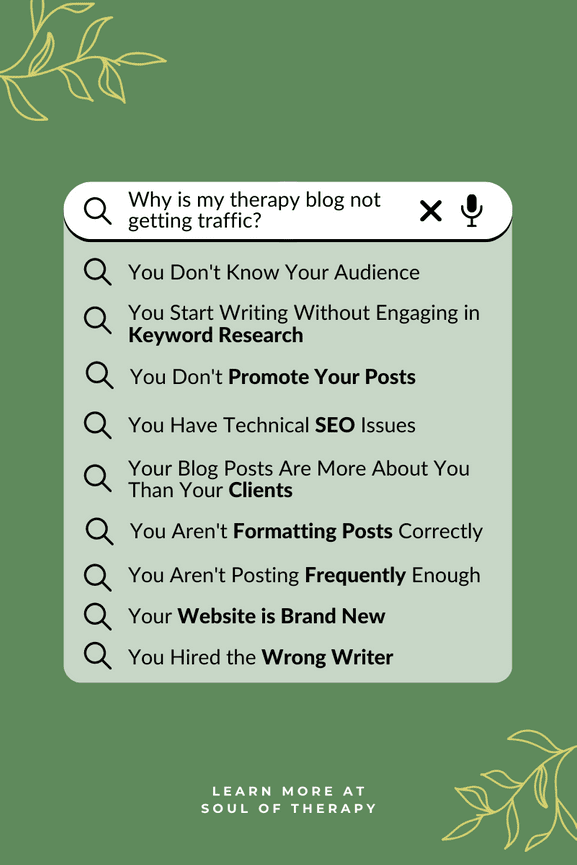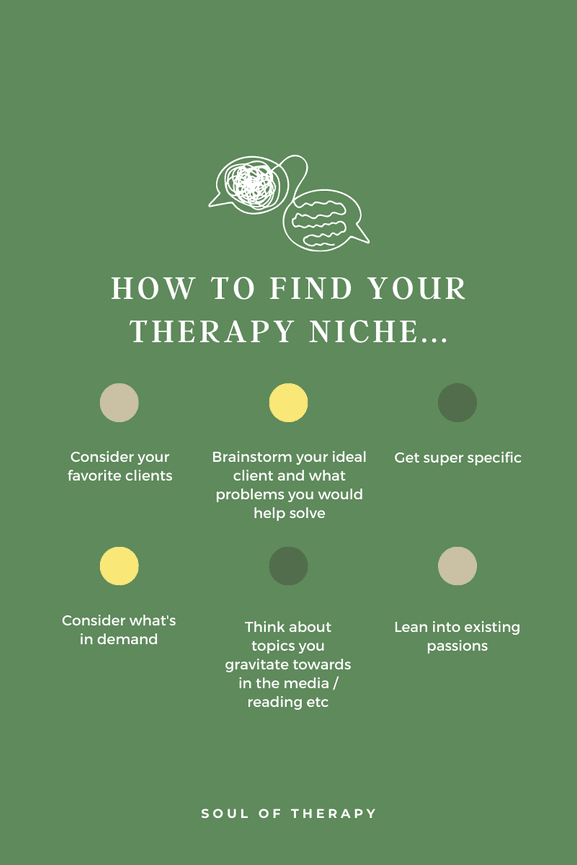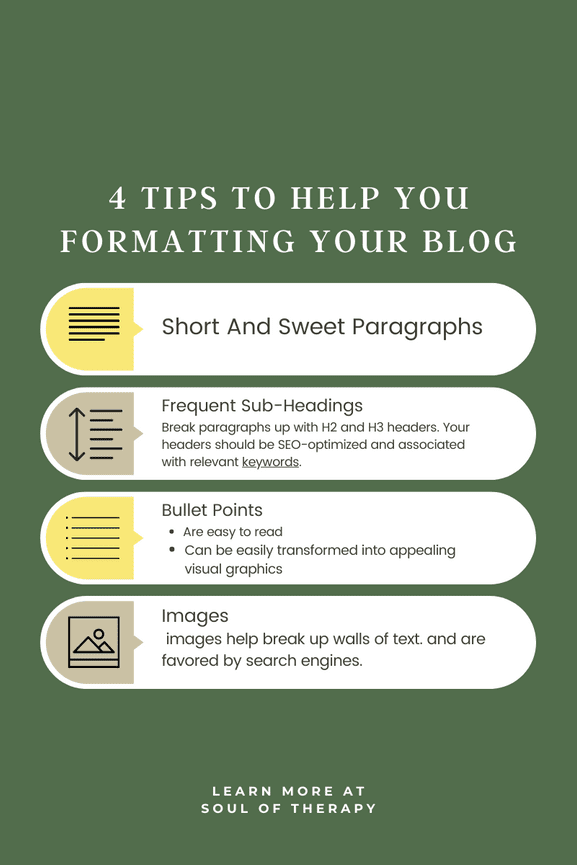I have my website, and I have my blog, but nobody is reading it! Why? I think the posts are pretty good. What's going on here?
I receive some variation of that email several times a week. Frustrated therapists reach out because they're tired of spending time writing amazing content that nobody reads.
I get it. It's frustrating. Blogging is tedious, and while most therapists recognize that it's important, simply doing it won't necessarily translate to success.
In fact, I look back on my own blogging journey with sweet nostalgia. I wrote endlessly and fearlessly, with a passion that felt unmatchable. And yet, nobody (except for maybe my mom and husband) read those posts.
At some point, I began gaining readers and building traction, but the process was slow and arduous, and I made so many mistakes along the way.
In the decade I've been doing this work, here are the best lessons I've learned.
Why Nobody Is Reading Your Therapy Blog

Maybe you wrote an amazing post, and it's full of wisdom and insight. Maybe it speaks directly to your potential clients. And you probably poured your soul into every word.
You click submit, and then you check a few weeks later. 1-2 clicks, if that. The first one may have been your coworker or office manager. The second one may have been your partner.
Not sure what's going on? Let's dive in.
You Don't Know Your Audience
Who are you writing for?
No, really. Who are you writing for?
Can you picture this person sitting across from you? Chatting with you over a cup of coffee? Reading your post over a cup of coffee alone?
If your answer is vague, you may need to spend some time evaluating your therapy niche. Writing to everybody generally appeals to nobody.
So think about who you want to find your website. Is it the overtired parent who feels worried about her toddler's constant meltdowns? Is it the couple on the brink of divorce? Is it the put-together professional who keeps hearing that therapy might help resolve job burnout?
That's not to say you only have to focus your content on one specific population. But knowing your ideal audience helps you structure your schedule and increase the chance of writing about topics that most connect with potential clients.
Even if your practice isn't focused on one specific niche, you should still consider the specific clients you want to work with.

You Start Writing Without Engaging in Keyword Research
One of the biggest mistakes therapists make is writing without a plan.
That's great if your goal is to just write. But if you're like 99% of private practice therapists, your blog acts as a platform. It's a way to increase your online visibility and draw in potential clients.
Keyword research allows you to ensure that you write content that people are most likely to read. When done well, this type of SEO work serves multiple purposes. It saves you time, drives more traffic to your site, and ideally increases the number of clients contacting you for therapy!
There are so many ways to get started with keywords, but you can get started by making a list of topics that seem most pertinent to your practice. Ideally, come up with about 5-10 relevant blog post ideas. This might be "CBT for teenagers" or "therapy for couples experiencing infertility."
Then, hop over to Google's Keyword Planner to look at monthly traffic estimates (how many visitors search that term). Ideally, you want to focus on what SEO calls "long-tailed keywords" instead of short-tail ones. A long-tail keyword might be, how does therapy help with insomnia? You have a much greater chance of ranking for that keyword than you would if you used insomnia.
A great post uses keywords naturally and without them being the absolute focus of the post.
You Don't Promote Your Posts
If you have great SEO and great posts that consistently generate high volumes of traffic, it isn't necessary to promote your posts on social media platforms.
But social media can augment your website strategy, regardless of your growth goals. Most major website templates allow you to automatically publish a post to integrated social platforms.
And don't overlook the immense benefits of building an email newsletter to complement your blogging strategy. Social media can and does change often, so building a mailing list can be invaluable for your practice.
You Have Technical SEO Issues
Search results naturally favor high-functioning sites that optimize a user's experience. If your site has faulty technical issues, people are less likely to want to view your blog post.
Poor mobile accessibility: Most people who view your website will do so on their phones, so you want to make sure your site looks as mobile-friendly and intuitive as possible.
No HTTPS security: Look at your website right now. Does it start with https://, or does it start with http://. You want the former because the latter will often result in the 'not secure' message Google penalizes lesser-secure sites with. Purchasing an SSL certificate is an easy fix, and it's necessary.
Broken links: Broken links can result in Google penalizing your content, and they can make for a poor user experience for clients. It's important to perform routine link analyses to identify and correct broken links.
Slow load speeds: If your website even takes a second too long to load, you risk losing valuable clients. Nobody wants to deal with a laggy site.
You can test for technical issues using Google Search Console, Google PageSpeed Insights, or Sitebulb.
Your Blog Posts Are More About You Than Your Clients
Imagine a potential client stumbles upon your website. They start reading your last post...but it's a long-winded story where you're talking more about your own experience or feelings than the topic at hand.
This may sound extreme, but many therapists make this mistake without realizing it. They use far too many 'I' and 'my' in their posts.
In my experience (no pun intended!), the best content is one that reads to your readers. The biggest downfall I see with blogging is therapists who focus way too much on themselves.
Instead, each blog post should essentially capture your practice, values, and the hard work you do. You want clients reading it and thinking, This person gets me! Or, you want other professionals reading it and thinking, This person knows their stuff! I'm going to keep them in mind as a referral.
When you write, ask yourself this: what will the reader be getting from this post? What will they take away from this experience?
You Aren't Formatting Posts Correctly

Blogging isn't English class, and your blog posts should not resemble a graduate school paper.
If you aren't familiar with formatting etiquette, start studying a few therapy blogs (or any blog!) that you really enjoy. You'll start to notice a few core themes including:
Short Paragraphs
Keep your paragraphs to three to four sentences max. You're writing with scannability in mind. Unless you're a true journalist, most people stumbling upon your website don't want to feel overwhelmed by massive walls of text.
Frequent Sub-Headings
Break paragraphs up with H2 and H3 headers. Your headers should be SEO-optimized and associated with relevant keywords.
Bullet Points
Bullet points are great because they:
- are easy to read
- can be easily transformed into appealing visual graphics
- emphasize specific issues
- appeal to the majority of readers who prefer scanning content
- quickly grab attention
- act as an entry point for further expansion
Images
We're all visual creatures, and images help break up walls of text. Search engines also like pictures.
Just remember that most images are copyrighted, so you want to ensure that you use images that aren't. You can consider using your own photos or making them on Canva. Subsequently, you can browse through free stock photo sites like Unsplash, Pixabay, and Pexels.
You Aren't Posting Frequently Enough
There isn't a set formula for how often you should post new content. In the early days of blogging, quantity often trumped quality. Bloggers churned out articles like
The Google algorithm has become much more sophisticated in recent years. More content isn't inherently the answer. You need to blend both quality and quantity.
That said, most of our clients see better results when they commit to posting (or outsourcing blog content) at least 2-4x a month. Clients who post 6-8x a month tend to rank faster, particularly if they specialize in specific niches and write comprehensive articles.
Your Website is Brand New
The best time to start blogging was as soon as humanly possible, but the next best time is right now.
That said, Google doesn't generally rank articles from a new website right away. It can take anywhere from 3-6 months to really start ranking. If you're among high competition (as many therapists are), it can take 6-12 months.
You Hired the Wrong Writer!
I don't like discrediting other writers because art is so subjective, but it's important to consider this reality: not all writers are created equally!
This is why I started this business. As a therapist, I wanted to write for other therapists. I know how nuanced and sensitive our work is. I know when writing comes across as disingenuous or stiff. The wrong idea or paragraph can turn off even the most open-minded client.
I don't believe you need to hire a writer with a mental health background. But I do believe it makes a difference.
Just because someone advertises themselves as an SEO writer doesn't mean they know how to write for your business. And just because someone is a mental health professional doesn't mean they inherently know how to write in a way that captures and converts.
If you outsource writing, consider that it may be a trial-and-error process. And once you find the right person, hold onto that relationship!
Driving More Traffic to Your Therapy Blog in 2023
If you're ready to get more traffic to your site, these tips should help! Be mindful of whatever negative beliefs you have about blogging, but don't let them stop you from writing content!
Remember to track your analytics and be patient. Like so many things in therapy (and in life), change takes time, and online results don't happen instantaneously.
And if you need an extra hand, we're here to help. We provide everything from initial SEO consultations to fully-automated content writing to expert-level mental health content.
Contact us today to get in touch!


0 Comments